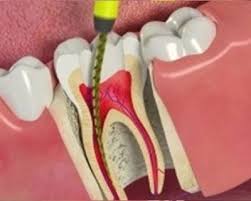Dental Care Tips – Root Canal Treatment

Root canal treatment is an oral treatment series for the impacted pulp of a decayed tooth that is designed to lead to the removal of the foreign infection and hopefully the protection of the remaining intact, unaffected tooth from any further microbial attack. A root canal, or also called a root canal, is usually recommended for patients whose decaying or damaged pulp has resulted in significant damage to the soft tissues in and around the tooth’s root. The dentist will perform a physical examination of your teeth and gums to determine whether you require a root canal or not. If you do require one, it is important that you understand what you can expect from your appointments. This article will provide you with an overview.
Read Also: Things Everyone Gets Wrong About Root Canal Treatment
The first step in Best Dentist in Delhi office root canal treatment is the collection of a sample tooth for testing. Your dentist may collect a sample from each tooth that is affected in this procedure. These samples are sent to a laboratory for analysis and testing. The dentist will probably take X-rays of these teeth as well, in order to be able to accurately assess the severity of any damage. Once all of the required material is collected, it is sent back to the dental clinic.
In most cases, the affected tooth will have to undergo surgical procedures to remove the decay. After the decay has been removed, the impacted tooth will need to be repositioned. This will typically require local anesthesia, which should be administered by a professional dental surgeon. The surgical procedure may take several hours to complete. A local anesthetic will be provided, but a general anesthesia should be avoided for the duration of the procedure.
After root canal treatment, the tooth’s remaining pulp will need to be sealed with a filling. Many dental procedures are able to accomplish this task successfully. Unfortunately, there are often complications that can occur, especially if the infection is allowed to continue. When a filling is not performed properly, the bacteria can enter into the blood stream through the broken tooth’s surface. If the infection is allowed to persist, it could result in additional dental procedures and even surgery.
Even if the dentist has performed a successful Root Canal Treatment in Noida, there is still the potential for additional dental pain or discomfort. This occurs when the tooth is exposed to an environment where bacterial growth occurs. As soon as the infected material is removed, the body quickly reabsorbed the bacteria. As a result, regular dental pain and discomfort can occur. Click on the website to know more about Urban Smiles Chicago.
However, when you follow proper dental hygiene, you can greatly reduce your chances of encountering a problem with a root canal treatment. First, you should thoroughly clean your teeth after each visit. Make sure to schedule a routine cleaning appointment for each tooth. It is also important to follow any recommended treatment regimens given by your dentist. Following proper treatment can greatly decrease your chances of experiencing additional dental pain or discomfort.
In addition, if a filling does not completely heal, you may need to have a new root canal treatment. When the filling has been completed and your dentist has recommended that you undergo a root canal treatment, there will likely be some swelling in your mouth. During this time, you will need to consult your dentist about what he or she recommends as a solution. Most dentists recommend the use of local anaesthetic to control the swelling and to minimize the discomfort associated with the procedure. Using local anaesthetic will make the procedure easier on your mouth, and you can avoid the risk of getting a reaction to the local anaesthetic.
If you do not use a local anaesthetic, your dentist may recommend a general anaesthetic. However, using a general anaesthetic to control the swelling will increase the risk of experiencing a negative reaction to the local anaesthetic. For this reason, your dentist will usually recommend the use of local anaesthetic if you are having a root canal treatment. As a result, it will be easier for you to deal with the discomfort that comes with this treatment.













